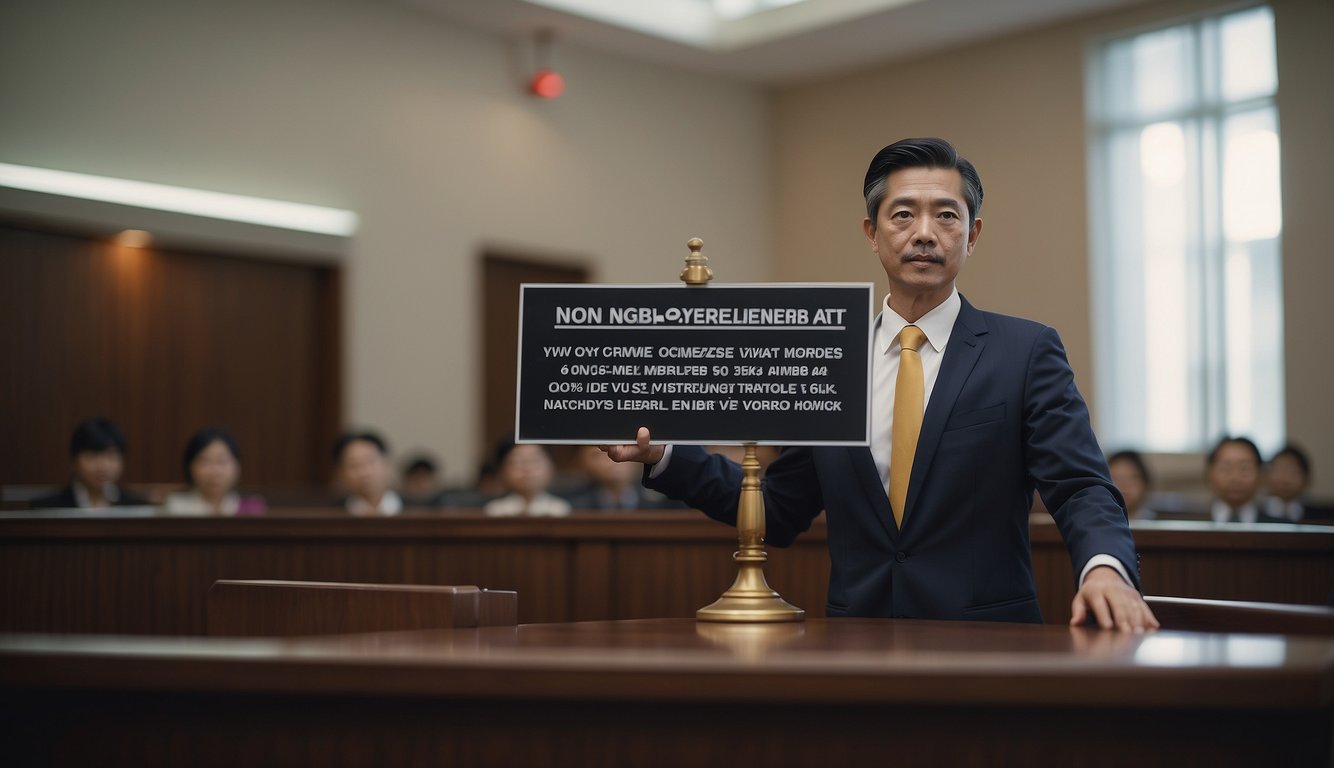If you’re looking to borrow money in Singapore, you should know about the Moneylenders Act. This is a law that regulates the moneylending industry in Singapore and aims to protect both borrowers and lenders. The Moneylenders Act sets out rules and regulations that licensed moneylenders must follow, and it also provides borrowers with certain rights and protections.

The Moneylenders Act was introduced in 2008, and it covers a range of issues related to moneylending in Singapore. This includes the licensing of moneylenders, regulations for moneylenders, and penalties for non-compliance. If you’re thinking of borrowing money from a licensed moneylender in Singapore, it’s important to understand your rights and protections under the Moneylenders Act.
Key Takeaways
- The Moneylenders Act regulates the moneylending industry in Singapore and provides protections for both borrowers and lenders.
- Licensed moneylenders must follow rules and regulations set out in the Moneylenders Act.
- Borrowers have certain rights and protections under the Moneylenders Act, including limits on how much they can borrow and protections against harassment.
Understanding the Moneylenders Act

If you are a borrower in Singapore, it is essential to know about the Moneylenders Act. This act governs the business of moneylending in Singapore and aims to protect borrowers from unscrupulous moneylenders. In this section, we will discuss the purpose and scope of the Moneylenders Act and key definitions.
Purpose and Scope
The Moneylenders Act Singapore is a legal framework that regulates the business of moneylending in Singapore. The Act sets out the rules and regulations that moneylenders must follow when conducting their business. The primary purpose of the Moneylenders Act is to protect borrowers from unscrupulous moneylenders who charge exorbitant interest rates and engage in unethical practices.
The Moneylenders Act applies to all moneylenders operating in Singapore. This includes both licensed and unlicensed moneylenders. The Act also applies to borrowers who take out loans from moneylenders.
Key Definitions
To understand the Moneylenders Act, it is essential to know the key definitions. Here are some of the key definitions:
- Moneylender: A person or entity that lends money to borrowers.
- Borrower: A person who borrows money from a moneylender.
- Interest: The amount of money charged by a moneylender for lending money to a borrower.
- Late payment fee: A fee charged by a moneylender when a borrower fails to make a loan repayment on time.
- Total repayment amount: The total amount that a borrower must repay to a moneylender, including the principal amount, interest, and any other fees.
Jurisdiction and Authority
The Moneylenders Act Singapore falls under the jurisdiction of the Ministry of Law. The Registrar of Moneylenders is responsible for administering the Act and issuing licenses to moneylenders. The Registrar also has the power to cancel licenses and take legal action against moneylenders who violate the Act.
In conclusion, the Moneylenders Act Singapore is an essential piece of legislation that protects borrowers from unscrupulous moneylenders. By understanding the purpose and scope of the Act and key definitions, borrowers can make informed decisions when taking out loans from moneylenders.
Licensing of Moneylenders

Are you interested in becoming a licensed moneylender in Singapore? The Moneylenders Act is the legislation that governs the moneylending business in Singapore. This section will provide you with information on the licensing process for moneylenders.
Eligibility Criteria
Before you can apply for a moneylender’s license, you must meet certain eligibility criteria. The Registrar will only grant a license to a person who is a fit and proper person to carry on the business of moneylending. This means that you must have a good character, and you must not have been convicted of any offence involving fraud or dishonesty.
If you are a company, body corporate, partnership, or firm, you must have at least one director or partner who is a fit and proper person. You must also have a minimum paid-up capital of S$100,000.
Application Process
To apply for a moneylender’s license, you must submit an application to the Registrar. You can do this online or in person at the Registry of Moneylenders. You will need to provide information on your business, your directors or partners, and your shareholders.
You will also need to pay a non-refundable application fee of S$1,500. Once your application has been processed, the Registrar will conduct a background check on you and your directors or partners. If you meet the eligibility criteria, the Registrar will grant you a license.
Ongoing Compliance
As a licensed moneylender, you must comply with the requirements of the Moneylenders Act. This includes maintaining accurate records of your loans and borrowers, and providing borrowers with a copy of the loan contract. You must also explain the terms of the loan to the borrower in a language that they understand.
You must renew your license annually and pay a renewal fee of S$2,000. The Registrar may also conduct inspections of your premises and records to ensure that you are complying with the requirements of the Act.
In conclusion, obtaining a moneylender’s license in Singapore requires you to meet certain eligibility criteria, submit an application to the Registrar, and comply with the ongoing requirements of the Moneylenders Act. The licensing process is designed to ensure that only fit and proper persons are allowed to carry on the business of moneylending, and that borrowers are protected from unscrupulous lenders.
Regulations for Moneylenders

If you’re a licensed moneylender in Singapore, you need to comply with the regulations set out in the Moneylenders Act. This legislation governs the business of moneylending and aims to protect borrowers from unscrupulous activities. In this section, we’ll take a closer look at some of the key regulations you need to be aware of.
Interest Rates and Fees
One of the most important regulations for moneylenders is the cap on interest rates and fees. Under the Moneylenders Act, licensed moneylenders are only permitted to charge certain fees and interest rates on loans. The maximum interest rate is 4% per month, regardless of the borrower’s income and whether the loan is secured or unsecured. Additionally, the total amount of interest charged on a loan cannot exceed the principal amount of the loan.
Loan Contracts and Terms
Another important regulation for moneylenders is the requirement to provide borrowers with a loan contract. The contract must clearly state the terms and conditions of the loan, including the interest rate, fees, repayment schedule, and any other relevant information. Moneylenders are also required to provide borrowers with a copy of the loan contract.
Advertising Guidelines
Moneylenders are also subject to advertising guidelines under the Moneylenders Act. Any advertising must be clear, accurate, and not misleading. Moneylenders are also prohibited from making false or misleading representations about their services.
Obligations and Conduct
Finally, moneylenders are required to meet certain obligations and conduct themselves in a professional manner. For example, moneylenders are required to exercise due diligence when assessing a borrower’s creditworthiness. They are also required to treat borrowers fairly and with respect, and to avoid engaging in any conduct that is contrary to the public interest.
In summary, the Moneylenders Act sets out a number of regulations that moneylenders in Singapore must comply with. These regulations cover areas such as interest rates and fees, loan contracts and terms, advertising guidelines, and obligations and conduct. By adhering to these regulations, moneylenders can help to ensure that they operate in a fair and transparent manner, while also protecting borrowers from unscrupulous activities.
Borrowers’ Rights and Protections

As a borrower in Singapore, you have rights and protections under the Moneylenders Act. This legislation is designed to ensure that licensed moneylenders operate fairly, and borrowers are protected from unscrupulous activities of unlicensed moneylenders or loan sharks.
Understanding Borrowing Limits
The Moneylenders Act sets out the borrowing limits that licensed moneylenders can offer you. As a borrower, you can only borrow up to a certain amount based on your income. The maximum amount that you can borrow depends on your annual income, and it is calculated as follows:
- If your annual income is less than $20,000, you can borrow up to $3,000.
- If your annual income is at least $20,000 but less than $30,000, you can borrow up to $3,000.
- If your annual income is at least $30,000 but less than $120,000, you can borrow up to six times your monthly income.
- If your annual income is $120,000 or more, you can borrow any amount.
Dealing with Harassment
Licensed moneylenders are not allowed to harass or threaten you in any way. If you feel that you are being harassed or threatened by a licensed moneylender, you can report the matter to the Registry of Moneylenders. The Registry will investigate your complaint and take action against the moneylender if necessary.
Recourse for Grievances
If you have a grievance against a licensed moneylender, you can take recourse under the Moneylenders Act. You can approach the Small Claims Tribunal or file a complaint with the Registry of Moneylenders. The Small Claims Tribunal can help you resolve disputes with licensed moneylenders, while the Registry can investigate complaints and take action against moneylenders who violate the law.
In conclusion, the Moneylenders Act provides borrowers in Singapore with important rights and protections. By understanding your borrowing limits, dealing with harassment, and knowing your options for recourse, you can borrow money with confidence and peace of mind.
Penalties for Non-Compliance

If you are a licensed moneylender, you must comply with the Moneylenders Act of 2008. Failure to comply with the Act can result in severe penalties and consequences. In this section, we will explore the penalties for non-compliance.
Unlicensed Moneylending Activities
Firstly, it is important to note that engaging in unlicensed moneylending activities is an offence under the Act. If you are found guilty of such an offence, you may face a fine of up to $300,000, imprisonment of up to four years, or both. This is a non-bailable offence, which means that you cannot be released on bail until your trial is over.
Consequences for Moneylenders
In addition to the penalties for unlicensed moneylending activities, there are also consequences for licensed moneylenders who fail to comply with the Act. If you are found guilty of an offence under the Act, you may face a fine of up to $40,000, imprisonment of up to two years, or both. If you are convicted of a subsequent offence, you may face a fine of up to $80,000, imprisonment of up to four years, or both.
Legal Recourse for Borrowers
If you have borrowed money from a licensed moneylender and you believe that they have violated the Act, you may have legal recourse. You can file a complaint with the Registry of Moneylenders, which is responsible for enforcing the Act. The Registry can investigate your complaint and take action against the moneylender if necessary.
In conclusion, the penalties for non-compliance with the Moneylenders Act of 2008 are severe. Whether you are an unlicensed moneylender or a licensed moneylender who has violated the Act, you may face fines, imprisonment, or both. If you are a borrower who has been mistreated by a moneylender, you have legal recourse and should file a complaint with the Registry of Moneylenders.
Additional Information for Stakeholders

Role of Financial Institutions
The Moneylenders Act affects various financial institutions in Singapore, including banks, finance companies, pawnbrokers, credit bureaus, and real estate investment trusts. As a bank or finance company, you may be impacted by the Act if you lend money to individuals or businesses. The Act sets out the licensing requirements for moneylenders, and it is important to ensure that you are not inadvertently lending money to an unlicensed moneylender.
Pawnbrokers should also be aware of the Act, especially if they offer loans to customers. The Act sets out the maximum interest rates that can be charged by licensed moneylenders, and pawnbrokers should ensure that they are not charging interest rates that exceed these limits.
Credit bureaus may also be impacted by the Act, as they provide credit reports to moneylenders. It is important that credit bureaus are aware of the licensing requirements for moneylenders, and that they only provide credit reports to licensed moneylenders.
Real estate investment trusts (REITs) should also be aware of the Act, especially if they are involved in lending money. REITs should ensure that they are only lending money to licensed moneylenders, and that they are not engaging in any activities that could be considered as moneylending.
Impact on Credit Markets
The Moneylenders Act has had a significant impact on the credit markets in Singapore. The Act has helped to regulate the moneylending industry, and has provided greater protection to borrowers. Licensed moneylenders are required to follow strict guidelines when lending money, and this has helped to prevent borrowers from falling into debt traps.
At the same time, the Act has also helped to create a more competitive credit market in Singapore. With the introduction of new players in the market, borrowers now have more options when it comes to borrowing money. This has helped to drive down interest rates, and has made it easier for borrowers to access credit.
Overall, the Moneylenders Act has had a positive impact on the credit markets in Singapore. It has helped to create a more regulated and competitive market, and has provided greater protection to borrowers. If you are a financial institution in Singapore, it is important that you are aware of the Act, and that you are complying with its requirements.
Frequently Asked Questions

What exciting changes were introduced in the Moneylenders Act of 2008 in Singapore?
The Moneylenders Act 2008 in Singapore has undergone several amendments since its enactment to provide borrowers with additional protection. Some of the exciting changes introduced include the requirement for licensed moneylenders to use a credit bureau to assess a borrower’s creditworthiness before granting a loan. The Act also mandates that licensed moneylenders must provide borrowers with a copy of the loan contract and a statement of account for each loan repayment.
How does the Money Lenders Act protect borrowers from unlicensed lending activities?
The Moneylenders Act in Singapore protects borrowers from unlicensed lending activities by making it illegal for any person or entity to carry out moneylending activities without a valid license. This Act also prohibits licensed moneylenders from using abusive language or threatening behavior when collecting loan repayments from borrowers.
What happens if one finds themselves unable to repay a licensed moneylender in Singapore?
If you find yourself unable to repay a licensed moneylender in Singapore, it is essential to inform the moneylender immediately. The Moneylenders Act provides for a maximum interest rate of 4% per month on the outstanding loan amount. The Act also mandates that licensed moneylenders cannot charge more than $60 per month for late repayment fees.
Are there any new exhilarating rules for licensed money lenders that came into effect recently?
Yes, there are new rules for licensed moneylenders that came into effect on 1 October 2015. These rules stipulate that licensed moneylenders can only charge a maximum of 10% of the principal loan amount as an upfront fee. Additionally, licensed moneylenders can only impose a maximum of $60 per month for late repayment fees.
How does the Moneylenders Act ensure fair interest rates are charged by lenders?
The Moneylenders Act in Singapore ensures that fair interest rates are charged by licensed moneylenders by mandating a maximum interest rate of 4% per month on the outstanding loan amount. This Act also stipulates that licensed moneylenders must provide borrowers with a copy of the loan contract and a statement of account for each loan repayment.
What actions does Singapore take to curb the activities of illegal money lenders?
Singapore takes several measures to curb the activities of illegal moneylenders, including conducting regular raids and investigations to identify and prosecute unlicensed moneylenders. The Singapore Police Force also works closely with community organizations to educate the public on the dangers of borrowing from unlicensed moneylenders. In addition, Singapore has set up a helpline to provide assistance to borrowers who have been harassed by illegal moneylenders.

